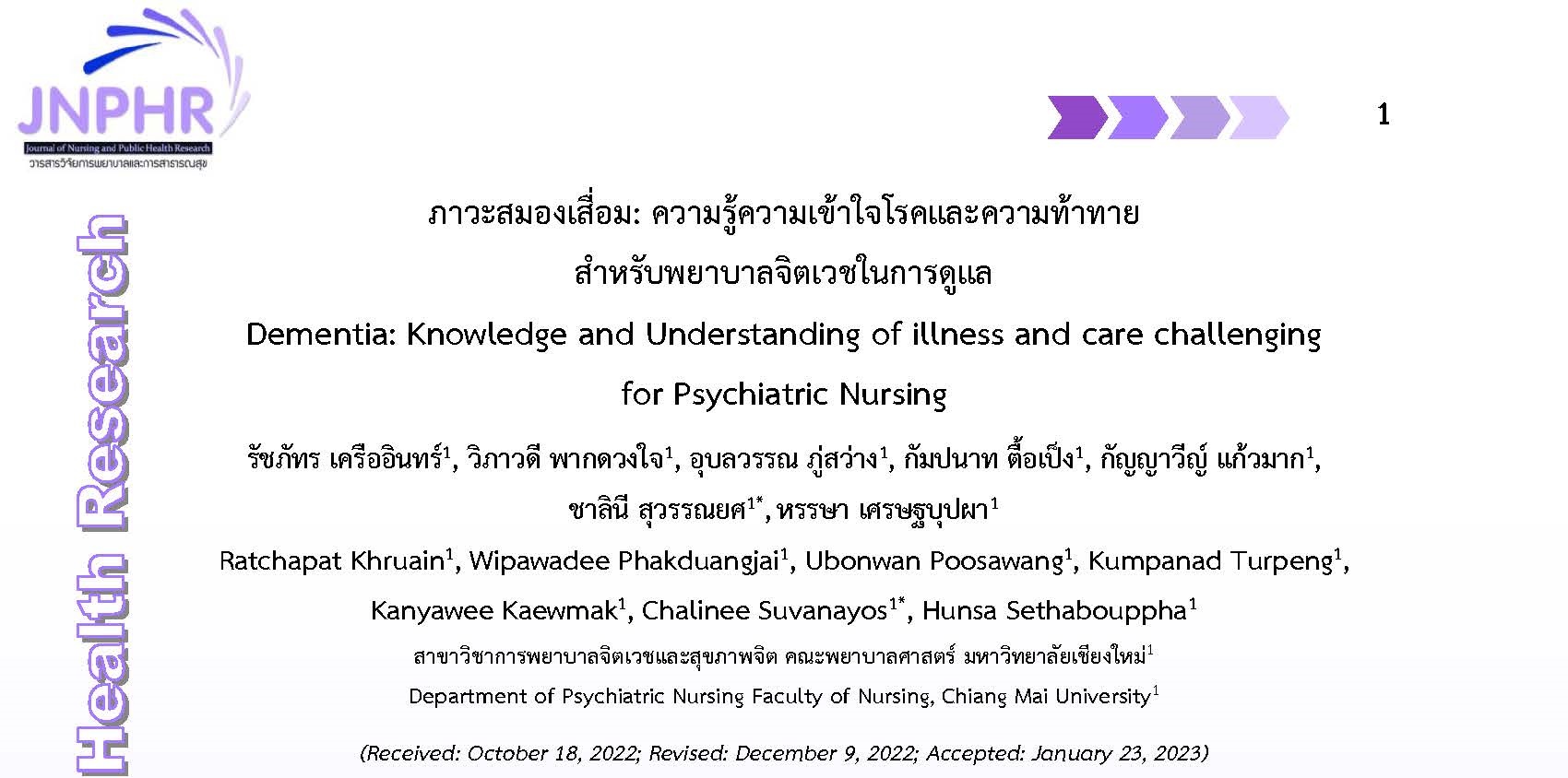Dementia: Knowledge and Understanding of illness and care challenging for Psychiatric Nursing
Keywords:
Knowledge of Care, Challenging, Psychiatric Nursing, DementiaAbstract
Currently, Thai society has entered an "Aging Society," which has rapidly increased the elderly population. As a result, as people age, their bodies weaken and suffer from more illnesses and deterioration. Dementia, in particular, is a common illness with an increasing prevalence. Dementia is a syndrome caused by deterioration of brain function, impaired memory, language expression and comprehension, cognitive and decision-making skills, activity engagement, and changes in personality affecting working efficiency or daily life. Caring for people with dementia is, therefore, a challenge for psychiatric nurses. This is a challenge because psychiatric nurses must provide nursing care for people with dementia who have complex behavioral and emotional problems. Therefore, if the psychiatric nurse already has knowledge and understanding of the condition of the disease, it will result in more efficient nursing practice, including the skills to care for people with dementia holistically. Caring for people with dementia is challenging for psychiatric nurses to provide comprehensive care following the nursing process, including health promotion, prevention, nursing care, and rehabilitation. Therefore, psychiatric nurses have knowledge of and understanding of dementia. Therefore, it will assist in nursing planning and providing accurate and appropriate nursing care according to the progression of dementia.
This article aims to provide psychiatric nurses with the knowledge obtained from the review of the literature on biological characteristics, genetic factors, etiology, disease progression, prognosis, and treatment. The condition of the disease is complex, so it is a challenge, and the role of a psychiatric nurse is to apply this knowledge as a guideline for caring for and helping people with dementia to have a better quality of life.
References
กชกร ฉายากุล. (2563). บทบาทพยาบาลในการดูแลผู้สูงอายุที่มีภาวะสมองเสื่อม. วารสารวิทยาลัยพยาบาลพระปกเกล้า, 31(2), 224-239.
ชัชวาล วงค์สารี และศุภลักษณ์ พื้นทอง. (2561). ภาวะสมองเสื่อมในผู้สูงอายุ: การพยาบาลและการดูแลญาติผู้ดูแล. วารสาร มฉก.วิชาการ, 22, 166-179.
ชุติพันธ์ หนูสุก. (2558). ความก้าวหน้าของเภสัชวิทยาของยาที่ใช้ในการรักษาโรคอัลไซเมอร์.วารสารวิชาการมหาวิทยาลัยอีสเทิร์นเอเชีย วิทยาศาสตร์และเทคโนโลยี, 9(2), 70-88.
โชติกา น้อยม่วง. (2565). สรุปรายงานการประชุมวิชาการประจำปี 2565 และ Workshop ครั้งที่ 11 Building Bridges in Dementia Diagnosis and Management สมาคมโรคสมองเสื่อมแห่งประเทศไทย. https://webportal.bangkok.go.th/user_files/400/991550397623d39e2888428.965834
ธวัชชัย เขื่อนสมบัติ. (2560). ประสบการณ์ของพยาบาลที่ดูแลญาติผู้สูงอายุในครอบครัวที่มีภาวะสมองเสื่อม [วิทยานิพนธ์ปริญญามหาบัณฑิตไม่ได้ตีพิมพ์]. จุฬาลงกรณ์มหาวิทยาลัย.
เบญจลักษณ์ มณีทอน และณรงค์ มณีทอน. (2559). จิตเวชศาสตร์ในโรงพยาบาลทั่วไป. (พิมพ์ครั้งที่ 3). เชียงใหม่: รัตนกุลการพิมพ์.
ปิติพร สิริทิพากร. (2559). คู่มือการพยาบาลการให้การดูแลและการเตรียมญาติและผู้ดูแลผู้ป่วยสูงอายุที่มีภาวะสมองเสื่อม. https://www2.si.mahidol.ac.th/division/nursing/sins/attachments/article/226/sins_ nursing_manual_2559_03.pdf.
โปรยทิพย์ สันตะพันธุ์, บุปผา ใจมั่น, วิจิตรา จิตรักษ์, ศิริญพร บุสหงส์ และเชาวลิต ศรีเสริม. (2563). ภาวะสมองเสื่อมในผู้สูงอายุ :บทบาทพยาบาล. วารสารวิชาการมหาวิทยาลัยการจัดการและเทคโนโลยีอีสเทิร์น, 17(2), 622-631.
ภรัญวิทย์ อนันต์ดิลกฤทธิ์. (2564). ภาวะสมองเสื่อม. วารสารศูนย์อนามัยที่ 9, 15(37), 392-398.
มุกดา หนุ่ยศรี. (2559). การป้องกันภาวะสมองเสื่อม. วารสารพยาบาลตำรวจ, 8(1), 227-240.
วีรศักดิ์ เมืองไพศาล (บรรณาธิการ). (2559). การป้องกัน การประเมิน และการดูแลผู้ป่วยสมองเสื่อม. กรุงเทพฯ: ห.จ.ก.ภาพพิมพ์.
สุทธิศรี ตระกูลสิทธิโชค. (2561) การป้องกันภาวะสมองเสื่อมในผู้สูงอายุ. วารสารการพยาบาลและการดูแลสุขภาพ, 36(4), 6-14.
สุทิศา ปิติญาณ. (2562). คู่มือการพยาบาล ผู้ป่วยสมองเสื่อมที่มีปัญหาพฤติกรรมและอารมณ์. สืบค้นเมื่อ 28 ตุลาคม 2565 จาก https://www2.si.mahidol.ac.th/division/nursing/sins/attachments/article/701/Nursing% 20Guide%20Dementia%20patients%20with%20behavioral%20and%20emotional% 20problems.pdf.
สุรัยยา หมานมานะ, โสภณ เอี่ยมศิริถาวร และสุมนมาลย์ อุทยมกุล. (2563). โรคติดเชื้อไวรัสโคโรนา 2019 (COVID19). วารสารสถาบันนำราศนราดูร, 14(2), 124-133.
Abraha I, Rimland JM, Trotta FM, Dell'Aquila G, Cruz-Jentoft A, Petrovic M, et al. (2017). Systematic review of systematic reviews of non-pharmacological interventions to treat behavioural disturbances in older patients with dementia. The SENATOR-OnTop series. BMJ Open. Retrieved from: https://bmjopen.bmj.com/content/7/3/e012759
Alzheimer’s association. (2020). Alzheimer’s Disease Facts and Figures [Internet]. Available from: https://www.alz.org/media/Documents/alzheimers-facts-and-figures.pdf
Khannok, S., (2015). Dementia. Retrieved from http://www.dmh.go.th/ downloadportal/morbidity/dementia.pd
Shives, L. R. (2012). Basic Concepts of Psychiatric-Mental Health Nursing. (8th ed.). Philadelphia, PA: Wolters Kluwer Health/Lippincott Williams & Wilkins.
World Health Organization. (2022). Dementia. https://www.who.int/news-room/fact-sheets/detail/dementia

Downloads
Published
How to Cite
Issue
Section
License
Copyright (c) 2023 Journal of Nursing and Public Health Research

This work is licensed under a Creative Commons Attribution-NonCommercial-NoDerivatives 4.0 International License.
1. บทความหรือข้อคิดเห็นใด ๆ ที่ปรากฏในวารสารวิจัยการพยาบาลและการสาธารณสุข ที่เป็นวรรณกรรมของผู้เขียน บรรณาธิการไม่จำเป็นต้องเห็นด้วย
2. บทความที่ได้รับการตีพิมพ์ถือเป็นลิขสิทธิ์ของ วารสารวิจัยการพยาบาลและการสาธารณสุข








